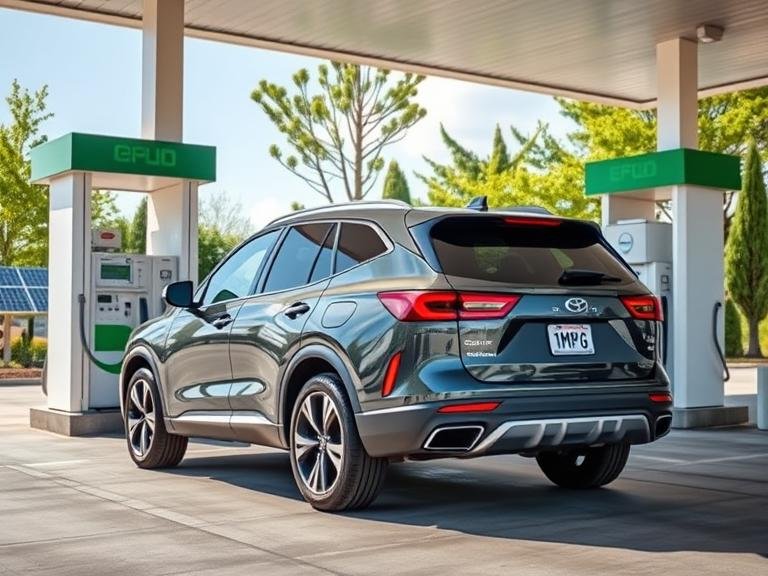The automotive landscape has dramatically evolved over the past decade, with fuel efficiency becoming a paramount concern for consumers seeking the perfect balance between utility and economy. When searching for the best MPG SUV, buyers face an exciting array of options that combine the versatility of sport utility vehicles with impressive fuel economy ratings that were once thought impossible for larger vehicles.
Table of Contents
Understanding MPG in Modern SUVs
Miles per gallon (MPG) represents the distance a vehicle can travel using one gallon of fuel, serving as the standard metric for measuring fuel efficiency in the United States. For SUVs, achieving exceptional MPG ratings requires sophisticated engineering that balances aerodynamics, weight distribution, powertrain efficiency, and advanced technology integration.
The best MPG SUV models typically fall into several categories: hybrid SUVs, plug-in hybrid electric vehicles (PHEVs), compact SUVs with efficient gasoline engines, and fully electric SUVs that eliminate gasoline consumption entirely. Each category offers distinct advantages depending on driving patterns, budget considerations, and environmental priorities.
Hybrid SUVs Leading the Efficiency Revolution
Hybrid technology has revolutionized the SUV segment, enabling manufacturers to deliver vehicles that achieve remarkable fuel economy without sacrificing the cargo space and elevated driving position that SUV buyers demand. Toyota has been particularly successful in this arena, with their hybrid SUV lineup consistently ranking among the most fuel-efficient options available.
The integration of electric motors with traditional gasoline engines allows these vehicles to optimize power delivery, using electric propulsion during low-speed driving and city commuting while seamlessly transitioning to gasoline power for highway cruising and demanding acceleration scenarios. This dual-power approach enables the best MPG SUV models to achieve ratings that often exceed 40 miles per gallon in combined driving conditions.
Regenerative braking systems further enhance efficiency by capturing energy typically lost during deceleration and storing it in the hybrid battery for later use. This technology proves particularly beneficial in stop-and-go traffic conditions, where traditional vehicles consume significant fuel while idling and accelerating from stops.
Compact SUVs Maximizing Efficiency Through Design
Smaller SUVs have embraced advanced engineering techniques to achieve impressive fuel economy ratings while maintaining the versatility that defines the SUV category. Manufacturers have focused on lightweight construction materials, aerodynamic optimization, and efficient transmission systems to create vehicles that deliver exceptional MPG performance.
Turbocharged engines have become increasingly common in the compact SUV segment, allowing manufacturers to downsize engine displacement while maintaining adequate power output. These smaller, forced-induction engines consume less fuel during normal driving conditions while providing additional power when needed through turbocharger boost.
Continuously variable transmissions (CVT) and advanced multi-speed automatic transmissions have also contributed significantly to improved fuel economy. These transmission technologies maintain engines within their most efficient operating ranges, reducing fuel consumption during various driving scenarios.
The Role of All-Wheel Drive in Fuel Efficiency
Traditional all-wheel drive systems often negatively impact fuel economy due to additional weight and mechanical complexity. However, modern AWD systems in the best MPG SUV models employ sophisticated technology to minimize efficiency penalties while providing enhanced traction and stability.
Many manufacturers now offer intelligent AWD systems that operate in front-wheel drive mode during normal driving conditions, automatically engaging the rear wheels only when additional traction is detected as necessary. This approach maintains fuel efficiency while preserving the all-weather capability that many SUV buyers require.
Some systems go further by completely disconnecting the rear axle during highway cruising, eliminating parasitic losses associated with spinning unused drivetrain components. These advanced systems demonstrate how engineering innovation continues to reduce the traditional trade-offs between capability and efficiency.
Electric and Plug-In Hybrid Considerations
Fully electric SUVs represent the ultimate in fuel efficiency, consuming zero gasoline while providing the utility and space that SUV buyers expect. While these vehicles require different infrastructure considerations, such as home charging capability and route planning for longer trips, they offer the potential for significantly reduced operating costs and environmental impact.
Plug-in hybrid electric vehicles (PHEVs) provide a compelling middle ground, offering electric-only driving for daily commuting while maintaining gasoline backup for longer journeys. The best MPG SUV models in this category can achieve equivalent MPG ratings exceeding 80 when operated primarily in electric mode, while still providing the flexibility of traditional gasoline operation when needed.
Battery technology continues advancing rapidly, with newer models offering increased electric-only range and faster charging capabilities. These improvements make electric and plug-in hybrid SUVs increasingly practical for a broader range of consumers and driving patterns.
Factors Affecting Real-World MPG Performance
While EPA ratings provide standardized comparisons between vehicles, real-world fuel economy depends on numerous factors including driving habits, terrain, weather conditions, and vehicle maintenance. Understanding these variables helps consumers make informed decisions and optimize their vehicle’s efficiency.
Aggressive acceleration and high-speed highway driving significantly impact fuel economy, particularly in hybrid vehicles that rely on electric assistance for optimal efficiency. Maintaining steady speeds and anticipating traffic conditions can substantially improve real-world MPG performance compared to EPA estimates.
Environmental factors such as temperature extremes, headwinds, and mountainous terrain also influence fuel consumption. Cold weather particularly affects hybrid and electric vehicles, as battery performance decreases and cabin heating systems require additional energy.
Maintenance and Long-Term Efficiency Considerations
The best MPG SUV models require specific maintenance practices to maintain optimal fuel efficiency throughout their service life. Regular maintenance including air filter replacement, proper tire inflation, and timely oil changes directly impacts fuel economy performance.
Hybrid and electric vehicles introduce additional maintenance considerations, including battery health monitoring and specialized service requirements. However, these vehicles often require less frequent traditional maintenance due to reduced engine operation and regenerative braking systems that reduce brake wear.
Understanding warranty coverage for hybrid and electric components helps consumers make informed long-term decisions about vehicle ownership costs and expected efficiency performance over time.
Future Trends in SUV Fuel Efficiency
Automotive manufacturers continue investing heavily in efficiency technologies, with future SUV models expected to achieve even more impressive MPG ratings through continued advancement in hybrid systems, lightweight materials, and aerodynamic design.
Solid-state battery technology promises to revolutionize electric SUV efficiency and range, while improvements in internal combustion engine design continue yielding incremental fuel economy gains. The integration of artificial intelligence and machine learning into vehicle systems also offers potential for optimizing efficiency based on individual driving patterns and conditions.
Frequently Asked Questions
What is considered good MPG for an SUV? Good MPG for an SUV typically ranges from 25-30 MPG for conventional gasoline models, while hybrid SUVs achieving 35-45 MPG are considered excellent. Electric SUVs eliminate gasoline consumption entirely, measured instead in miles per kilowatt-hour (kWh).
Do hybrid SUVs require special maintenance? Hybrid SUVs require some specialized maintenance for their battery and electric motor systems, but often need less frequent traditional maintenance due to reduced engine operation. Most hybrid systems are covered by extended warranties for added peace of mind.
How does all-wheel drive affect SUV fuel economy? Traditional AWD systems can reduce fuel economy by 1-3 MPG due to additional weight and mechanical losses. However, modern intelligent AWD systems minimize this impact by operating in front-wheel drive mode when AWD isn’t needed.
Are plug-in hybrid SUVs worth the extra cost? Plug-in hybrid SUVs can provide excellent value for drivers with regular access to charging and daily commutes within the electric-only range. The ability to run on electricity for short trips while maintaining gasoline backup for longer journeys offers exceptional versatility.
How accurate are EPA MPG ratings for SUVs? EPA ratings provide standardized comparisons but real-world results vary based on driving habits, conditions, and maintenance. Most drivers achieve results within 10-15% of EPA estimates when driving in mixed conditions similar to the EPA test cycles.
What factors most significantly impact SUV fuel economy? Driving style has the greatest impact on fuel economy, with aggressive acceleration and high speeds significantly reducing efficiency. Vehicle maintenance, tire pressure, cargo load, and weather conditions also meaningfully affect MPG performance.

